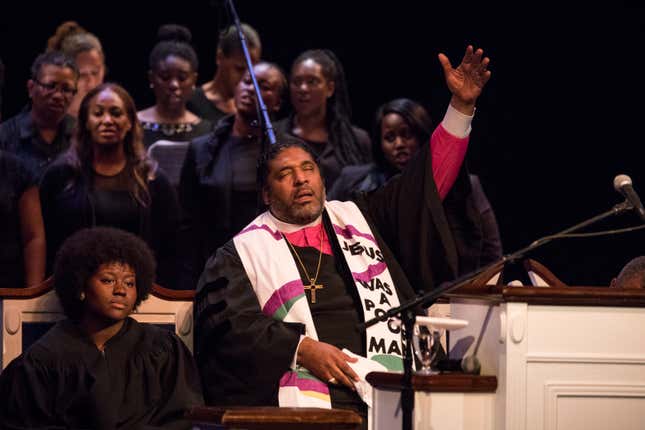
Renowned civil rights leader Bishop William J. Barber II delivered his last sermon as pastor of Greenleaf Christian Church on Sunday. Barber has preached at the Goldsboro, North Carolina church for the last 30 years. As he left his decades-long position, Barber handed over the reins of the church to the next generation.
“I give you now the torch, the passing of the torch, the flame of the spirit that has kept me and all others before me all the way from Peter on forward,” he said to the woman succeeding him, Rev. G. Shyrl Hinnant-Uzzell, “and that same pastoral spirit and fire because you gotta have fire to be a pastor.”
But just because Barber is passing the pastoral church doesn’t mean he’s stepping away from leadership. Barber, who is well-known for his leadership of the Poor People’s Campaign: A National Call for a Moral Revival and his Moral Monday protests, spoke to the Root about his next chapter late last year.
Barber announced that he was heading up the Yale Divinity School’s new Center for Theology and Public Policy. “I’m excited to move from pastoring that is thirty-five years of pastoral ministry with the congregation,” Barber told The Root in December, “to, in a sense, pastoring the movement with this center.”
The goal of the center is to train the next generation of “movement leaders” in the practice of moral leadership. “We’re gonna share what I’ve learned to lead research on the deep connection between theology, deepest moral values, constitutional values, and just policies in the present,” said Barber.
The divinity school launched in April, and Barber wasn’t the only prominent civil rights and theological leader attached to the school. As we discussed with Barber in December, Valerie Eguavoen, Roz Pelles, and Jonathan Wilson-Hartgrove also joined the center.
As Barber stepped into his new role at Yale and away from the church, he was celebrated by the political allies he’s made along the way, including President Joe Biden.
“Thank you for showing all of us how to do justice, love mercy, and walk humbly. I’ll never forget your homily at my inaugural prayer service when you called on us to be repairers of the breach and heal the soul of the nation,” said the President in a video message to Barber, according to a press release obtained from CNN News.
Speaking with the Root last year, Barber expressed his enthusiasm for his new position shaping the next generation of movement leaders.
“This work is hard, but it’s worth it,” he told The Root. “I would not want to leave this life and not try in some way to see what we’ve learned, what we know, what we are yet to know into the veins of this society and into the hearts and minds of generations of leaders that are already here, but also will be here long after many of us.”

